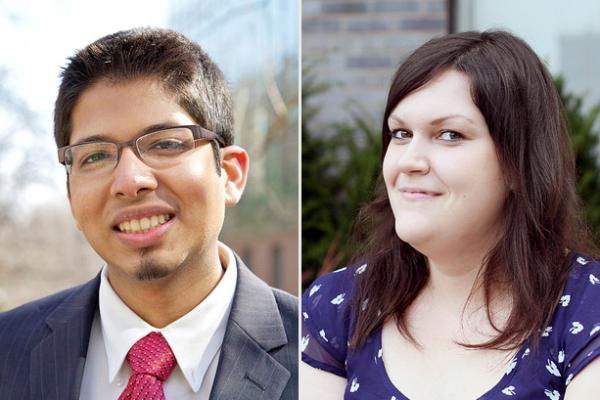
Global recognition for undergraduate work at U of T
Published: October 4, 2012
University of Toronto alumni Erin Ramsperger and Sami Khan are heading to Dublin next month to receive medals of academic excellence from the president of Ireland and take part in a global undergraduate summit.
Ramsperger, a psychology major who graduated in June, and Khan, a recent engineering graduate, will join 37 other scholars and researchers from around the world at the 2012 Undergraduate Awards or UA.
“We are delighted with this news and offer hearty congratulations to Sami and Erin,” said Professor Jill Matus, Vice-Provost, Students. “This provides evidence that U of T continues to attract and graduate the world’s best and brightest.”
Award recipients are selected through a grueling evaluation process which begins with each applicant submitting their own research paper. The award is reviewed by more than 170 academic judges. The competition, which began in 2008 as a national contest, is now global and received almost 3,000 submissions this year.
“Upon graduation, students are met with a crossroads and the decisions they make and the research they conduct and engage with at an undergraduate level has the potential to shape their career vision and goals,” said UA spokesperson Sasha de Marigny. “By awarding remarkable undergraduate research, UA encourages an intellectual curiosity among students, to challenge themselves to propose fresh, new arguments and ultimately gives them the confidence to believe in the validity of their ideas and share them on a global platform.”
Ramsperger’s award-winning research is concerned with the underlying neurocognitive mechanisms of schizophrenia, and specifically with psychosis. She proposed a new framework to synthesize two existing theories of schizophrenia and provide a more cohesive explanation of the mechanisms driving psychosis.
“It is important for undergraduate work to be recognized because undergraduates need to develop confidence in their work if they are to be successful in the world of academia,” Ramsperger said. “Recognition is the reward that will help to shape future success.”
Khan’s research, Centrifugal Separation of Feces for a Novel Toilet Design, was supported by U of T’s Reinvent the Toilet Challenge team and examines the potential for centrifugation to clarify liquid waste for UV disinfection, eliminating disease-causing pathogens.
“I read that over 2.5 billion people today do not have access to a safe way of defecation, which further results in millions of avoidable deaths every year through water borne diseases,” said Khan. “Having myself spent over half of my life living in a developing country, I was very eager to contribute to this growing global concern in whatever small way I could.
"This award is such an honour and a testament to the strong support network offered at U of T Engineering. Professor Mark Kortschot provided me with valuable and dedicated supervision during my thesis work,” Khan added.
In addition to the winners of the medals of academic excellence, the top ten per cent of all submissions received by UA are recognized as Highly Commended. Making that elite list in the philosophy and theology category is recent U of T alumnus Andrew Molas.
“I feel that a large number of undergraduate students are very critical of their own writing — which is a good thing, because it shows they actually care about the work they are producing — but they feel that their writing may not be "good enough" to submit for either publication or for presenting at undergraduate conferences,” Molas said. “My advice to them is to submit some of their best work, ask their professors for tips or suggestions on how to strengthen their papers, and to submit it anyway.
"There is no harm in trying, and the results may surprise them. It is an incredible honour to be recognized for your work, not only by your peers but by faculty members and institutions (both domestic and abroad)."
It’s a sentiment echoed by Ramsperger.
“It can be difficult to gain the attention of academics and scholars when you are an undergraduate student, especially when it comes to applying to graduate school,” said Ramsperger, who is currently working on applications to continue her education at the PhD level. “I was very confident in my work and thought that it had the potential to make a significant contribution to the field of psychology.”
Khan is looking forward to the opportunity to meet students from a variety of disciplines around the world at what the UA is calling a Davos for students.
“The UA Summit aims to build a genuine global community around the exceptional Undergraduate Award winners, providing the opportunity for them to meet like-minded students from all over the world,” said de Marigny. “From panel discussions with top graduate recruiters and PhD researchers who have commercialized their research to workshops with young achievers, leaders and entrepreneurs from a variety of backgrounds – students will gain access to an invaluable smorgasbord of expert advice, experience and information to help them build their own career paths.”



